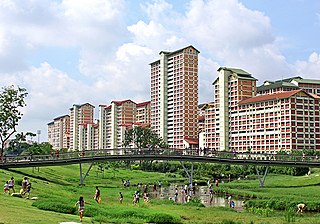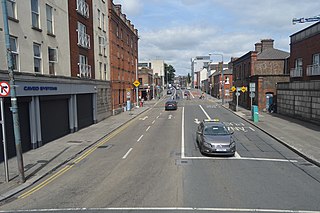
Dublin is the capital city of Ireland. On a bay at the mouth of the River Liffey, it is in the province of Leinster, bordered on the south by the Dublin Mountains, a part of the Wicklow Mountains range. At the 2022 census, the city council area had a population of 592,713, while Dublin and its suburbs had a population of 1,263,219, and County Dublin had a population of 1,501,500, making it the largest city by population on the island of Ireland.

Conservation in the Republic of Ireland is overseen by a number of statutory and non-governmental agencies, including those with responsibility for conservation of the built environment and conservation of the natural environment in Ireland. Conservation has sometimes been a contentious issue, with debates impacting its progress since the 1960s. Concrete initiatives are sometimes driven by European Union (EU) heritage protection and environmental policies, including EU environmental law, which – as a member – the Irish government is obliged to adopt and implement.

Public housing, also known as social housing, refers to affordable housing provided in buildings that are usually owned and managed by local government, central government, nonprofit organizations or a combination thereof. The details, terminology, definitions of poverty, and other criteria for allocation may vary within different contexts, but the right to rent such a home is generally rationed through some form of means-testing or through administrative measures of housing needs. One can regard social housing as a potential remedy for housing inequality. Within the OECD, social housing represents an average of 7% of national housing stock (2020), ranging from ~34% in the Netherlands to less than 1% in Colombia.
Education in the Republic of Ireland is a primary, secondary and higher education. In recent years, further education has grown immensely, with 51% of working age adults having completed higher education by 2020. Growth in the economy since the 1960s has driven much of the change in the education system. For universities there are student service fees, which students are required to pay on registration, to cover examinations, insurance and registration costs.
Adamstown is a planned suburban development in western County Dublin, Ireland located circa 16 km from Dublin city centre in the jurisdiction of South Dublin County Council. The first new town in Ireland since Shannon Town in the 1960s, the development-in-progress is based on a 220 hectare Strategic Development Zone site south of the N4 road and Lucan, west of a River Liffey tributary, the Griffeen River, and north of the Grand Canal.
University College Dublin Students' Union is the students' union of University College Dublin. It is the largest students' union in Ireland.

The Health and Safety Authority (HSA) is the national body in Ireland with responsibility for occupational health and safety. Its role is to secure health and safety at work. It is an Irish state-sponsored body, established under the Safety, Health and Welfare at Work Act, 1989, and reports to the Minister for Enterprise, Trade and Employment.

South Dublin County Council is the local authority of the county of South Dublin, Ireland. It is one of three local authorities created by the Local Government (Dublin) Act 1993 to succeed the former Dublin County Council before its abolition on 1 January 1994 and one of four councils in County Dublin. As a county council, it is governed by the Local Government Act 2001. The council is responsible for housing and community, roads and transportation, urban planning and development, amenity and culture, and environment. The council has 40 elected members. Elections are held every five years and are by single transferable vote. The head of the council has the title of Mayor. The county administration is headed by a chief executive, Daniel McLoughlin. The county town is Tallaght, with a civic centre at Monastery Road, Clondalkin. It serves a population of approximately 192,000.

Homelessness in the United Kingdom is measured and responded to in differing ways in England, Scotland, Wales and Northern Ireland, but affects people living in every part of the UK's constituent countries. Most homeless people have at least a modicum of shelter but without any security of tenure. Unsheltered people, "rough sleepers", are a small minority of homeless people.

A halting site is purpose-built residential accommodation for Travellers provided by a local municipal authority. The halting site has an individual bay for each family unit with a full range of services provided in a small structure on each bay.
The Garda National Immigration Bureau is a unit of the Garda Síochána, the police force of Ireland. It was formed in May 2000, and is responsible for the enforcement of immigration law in Ireland.

Roderic O'Gorman is an Irish Green Party politician who has served as leader of the Green Party since July 2024 and as Minister for Children, Equality, Disability, Integration and Youth since June 2020. He has been a Teachta Dála (TD) for the Dublin West constituency since 2020. He previously served as chair of the Green Party from 2011 to 2019.

The Social Democrats are a social democratic political party in Ireland. Led by Holly Cairns since March 2023, the party was launched on 15 July 2015 by three independent TDs: Catherine Murphy, Róisín Shortall, and Stephen Donnelly. It promotes the Nordic model of political economy and pro-European views.

Cian O'Callaghan is an Irish politician who has been a Teachta Dála (TD) for the Dublin Bay North constituency since the 2020 general election. He is the Housing spokesperson for the Social Democrats and became deputy leader of the party in 2023. He served as a member of Fingal County Council from 2009 to 2020, and was Ireland's first openly gay mayor.
Homelessness in Ireland is an evolving social issue. During the 19th century, homelessness was a pervasive impact of the Great Famine (1845–1852). During the 20th century, homelessness in Ireland was associated with older males who may have had addiction or alcoholism issues. However, since the 1990s and into the 21st century, it has been recognised that the homeless population includes increasing numbers of women and children. Commentators have attributed the ongoing events to the post-2008 Irish economic downturn and 'subsequent fiscal adjustments', and the parallel impacts of reduced familial incomes, mortgage arrears and rental increases which followed impacts to housing supply.

The 2019 Irish local elections were held in all local authorities in Ireland on Friday, 24 May 2019, on the same day as the 2019 European Parliament election and a referendum easing restrictions on divorce. Each local government area is divided into local electoral areas (LEAs) where three to seven councillors are elected on the electoral system of proportional representation by means of the single transferable vote.

Squatting in the Republic of Ireland is the occupation of unused land or derelict buildings without the permission of the owner. In the 1960s, the Dublin Housing Action Committee highlighted the housing crisis by squatting buildings. From the 1990s onwards there have been occasional political squats in Cork and Dublin such as Grangegorman, the Barricade Inn, the Bolt Hostel, Connolly Barracks, That Social Centre and James Connolly House.

Blackhall Place is a street in Dublin, Ireland which was laid out in the 1780s on the area which previously formed Oxmantown green.

The Irish defective block crisis affects several counties within the Republic of Ireland. To date the counties most severely impacted have been County Donegal and County Mayo, with other counties having fewer affected buildings. An expert committee established in 2016 by the then Minister of Housing and Urban Renewal investigated the causes in both County Donegal and County Mayo, and concluded that the principal cause of the damage was due to the use of defective concrete blocks. Within county Donegal this was originally termed the Mica scandal in 2011, which is the point at which homes and other buildings began showing signs of cracking and decay. The term "mica scandal" arose because the expert committee had observed that defective concrete blocks within County Donegal contained excessive quantities of the mineral mica liberated within the binder. Within County Mayo the expert committee concluded that the defective blocks were caused by internal sulphate attack sourced from framboidal pyrite within the aggregate, as evidenced from both presence of framboidal pyrite and elevated sulphate content.
Protests at several locations in Ireland started in early November 2022 after the development of sites in various parts of the country as temporary asylum seeker shelters by the Department of Children, Equality, Disability, Integration and Youth (DCEDIY), as it attempted to accommodate the influx of 65,000 refugees during 2022. Protests have been held in East Wall, Ballymun, Drimnagh and elsewhere in Dublin; Fermoy and Mallow in County Cork; Kill, County Kildare; Lismore, County Waterford; Mullingar, County Westmeath; Inch, County Clare; and Rosslare Harbour, County Wexford.














